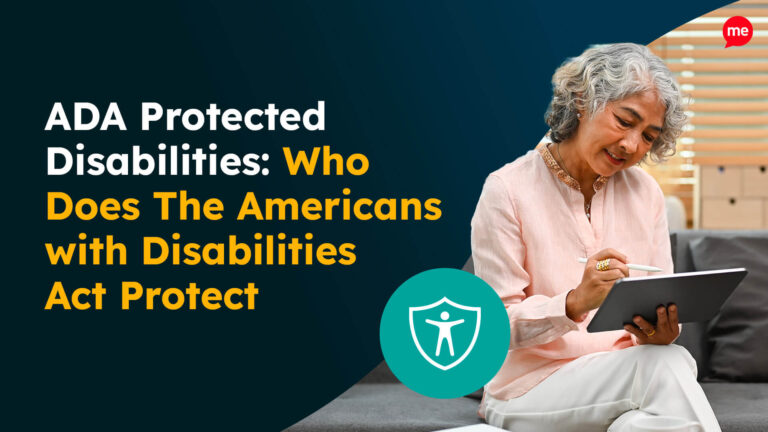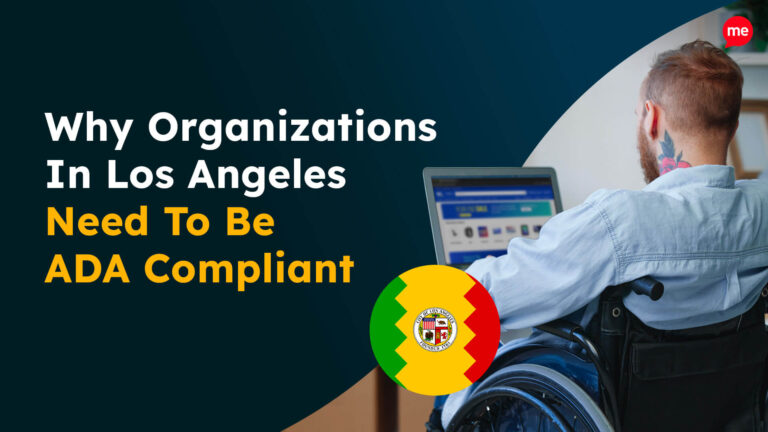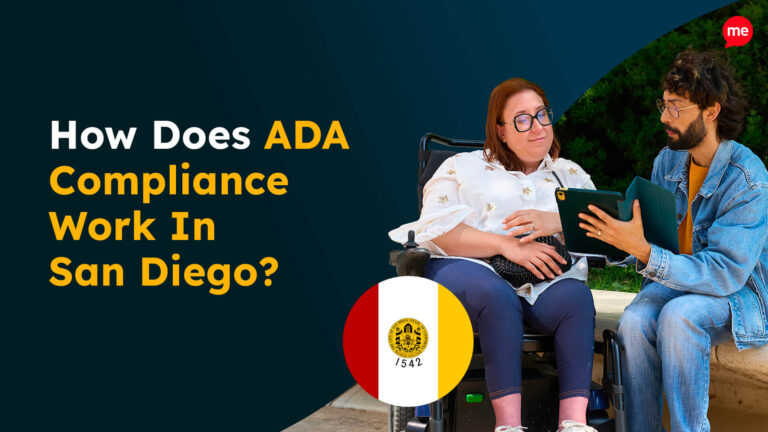Get A Free ADA Compliance Audit Of Your Website
Download NowIn recent years, the digital revolution has transformed the way businesses interact with customers, making website accessibility a crucial consideration. However, beyond mere convenience, it’s also a legal imperative to ensure that disabled web browsers are not discriminated against on online platforms.
With a disability prevalence of 11.8%, Virginia is among a handful of states to have taken a proactive stance in enacting stand-alone legislation, providing more technical requirements for businesses to follow regarding information and communication technology (ICT).
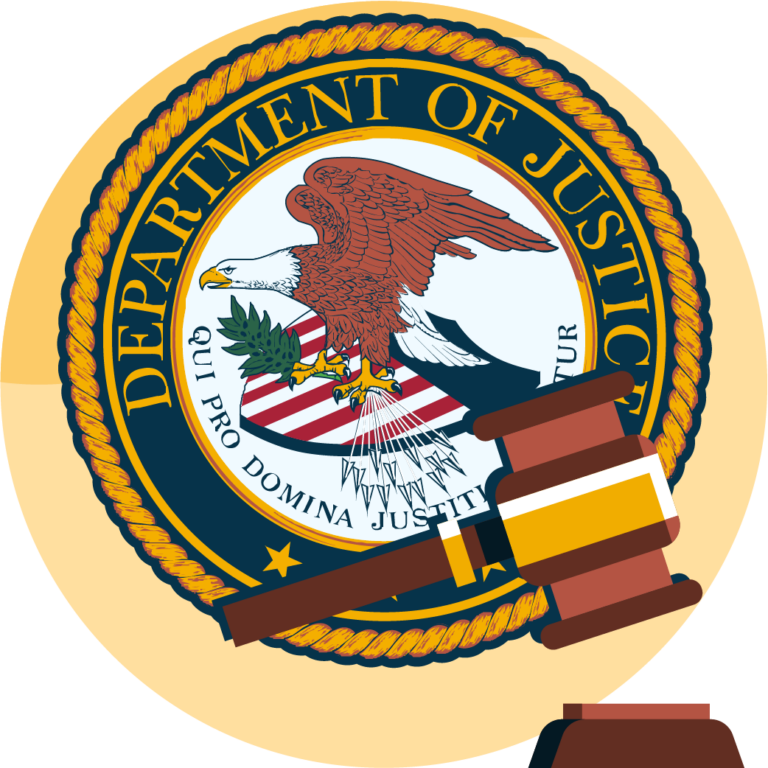
Web Accessibility Laws in Virginia
The additional technical guidelines currently only apply to state agencies. However, federal legislation applies to both public and private entities in Virginia just as much as elsewhere. Here’s a comprehensive overview of each law.
The Virginia Information Technology Access Act
The Virginia Information Technology Access Act is based on Web Content Accessibility Guidelines (WCAG) Level 2 AA compliance (more on that below). It requires all state agencies, colleges, universities, and other public organizations to make digital information accessible to individuals with disabilities.
Developed by the Virginia Information Technologies Agency (VITA), the Act covers various types of disabilities and provides standards for all online elements, including website architecture, demographic information systems (GIS), information security, program and technology management, and third-party use policies. However, it is particularly stringent about closed captioning on videos. To ensure web-based audio and video are perceivable and understandable to everyone, captions must be:
- Present
- Synchronized
- Equivalent to the spoken words
- Accessible using screen readers
The Americans With Disabilities Act
The Americans with Disabilities Act (ADA) was originally developed to address physical accessibility challenges. However, due to the proliferation of online technologies, key definitions have been expanded to encompass digital platforms, which are viewed as extensions of physical spaces.
There are five ADA titles in total, three of which relate directly to digital accessibility. The first and third apply to both private and public entities, while the second focuses only on state-operated services and programs:
- ADA Title I prohibits employment discrimination, mandating information related to recruitment, hiring, promotions, training, job assignments, and termination be accessible to all.
- ADA Title II addresses the accessibility of public services, programs, and activities, mandating state and local governments make digital information equally available to disabled citizens.
- ADA Title III applies to any public-facing business, mandating access to goods, services, facilities, privileges, advantages, etc., be available for all, regardless of disabilities or limitations.
For more information check out this blog on ADA website compliance in Virginia.

Section 508 of the Rehabilitation Act
Section 508 of the 1973 Rehabilitation Act applies primarily to federal agencies. It requires that all websites, software, information technology, and other digital assets developed, owned, or operated by state agencies be accessible to individuals with disabilities. The two primary goals of Section 508 are to ensure that:
- Federal employees have equal access to online resources – Eliminating digital barriers allows full participation and productivity, regardless of disability.
- Members of the public have equitable access to information and services. Access to public-facing information must be comparable for disabled and non-disabled citizens.
Stay ahead of the game when it comes to Digital Accessibility laws and compliance in the United States. Learn about all the different federal and state-level regulations, see real examples of web accessibility lawsuits in different regions and discover a 7-step action plan for building accessible websites.
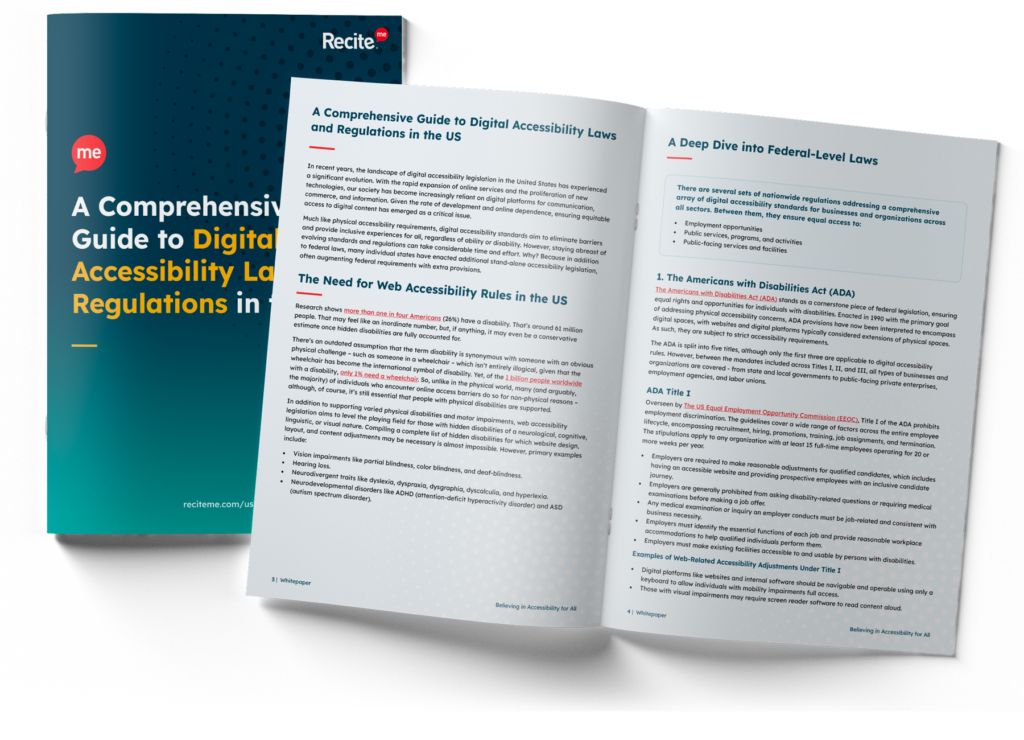
What Types of Business Are Affected By Virginia Web Accessibility Legislation?
At first glance, it may appear that the ADA is the only piece of web accessibility legislation in Virginia that applies to both public and private entities. However, that’s not necessarily the case. Privately run for-profit organizations – and even some non-profit organizations – may be required to uphold Section 508 standards, as any business within a government agency supply chain is expected to comply. This includes:
- Direct or indirect subcontractors responsible for technology, software provision, telecommunications, construction, engineering, etc.
- Non-profit grant recipients like charities, conservation groups, research institutions, and community development organizations.
- For-profit recipients of federal funding in fields like healthcare, finance, education, and transport.
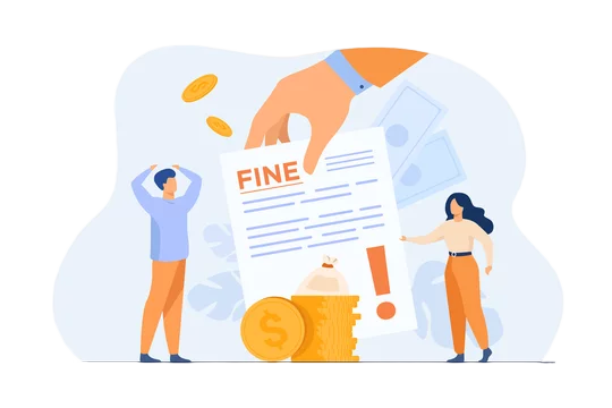
What are The Risks and Consequences of Non-Compliance?
Companies found to be non-compliant with Virginia web accessibility standards, the ADA, or Section 508 risk paying hefty fines. For example, ADA and Section 508 violations carry a fine of $55,000 for the first violation, jumping to $110,000 for each subsequent breach.
Private legal action resulting in additional fines, court costs, and settlement fees is also a possibility. Plus, any entity that receives government funding might have their contracts revoked.
There’s also a long list of indirect financial repercussions resulting from revenue loss caused by negative PR, decreased brand loyalty, and reduced market reach. Additional risks include lower job satisfaction and retention rates among employees and enhanced scrutiny by regulatory agencies moving forward.
Notable Digital Accessibility Lawsuits in Virginia
Any company doing business in Virginia via a website can have a lawsuit filed against them. That means that, aside from state agencies, any of the 200,000+ employer establishments in Virginia could find themselves in court for noncompliance.
It’s essential to note that the plaintiffs initiating court action don’t need to be from Virginia. For example, the United States Court of Appeals for the Fourth Circuit recently ruled that a disabled Florida resident had standing to sue a Maryland hotel under the ADA Title III, despite never intending to stay there.
This ruling also sets a precedent in Virginia that may encourage potential plaintiffs to file ‘web accessibility tester’ lawsuits, which can be incredibly damaging – especially for small businesses with limited cash flow. However, not all lawsuits proceed to trial because:
- Judges dismiss some cases due to insufficient evidence.
- Some plaintiffs voluntarily withdraw their claims – especially if defendants pledge to make the necessary web accessibility upgrades.
- As many as 92% of lawsuits are settled out of court.
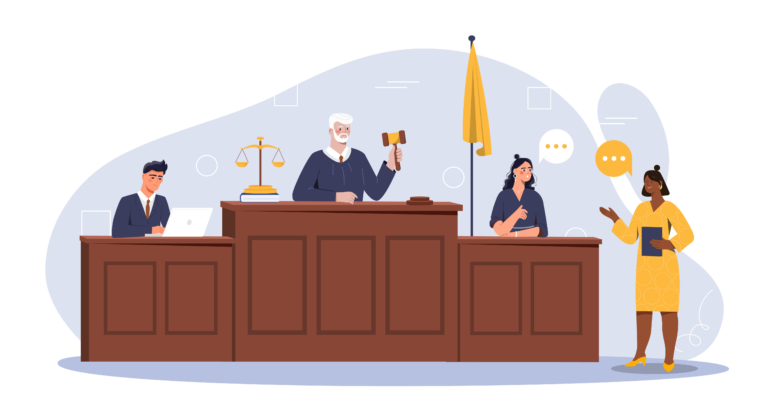
When claims are settled out of court, the details and financial sums are usually difficult (or impossible) to determine. However, those that do typically go on record, with further information on proceedings publicly available. Here’s a few links to recent web accessibility lawsuits in Virginia:
- Carroll V. Peoples Bank, Inc.
- Mejio V. Alba Web Designs, LLC
- Toths V. Virginia Credit Union
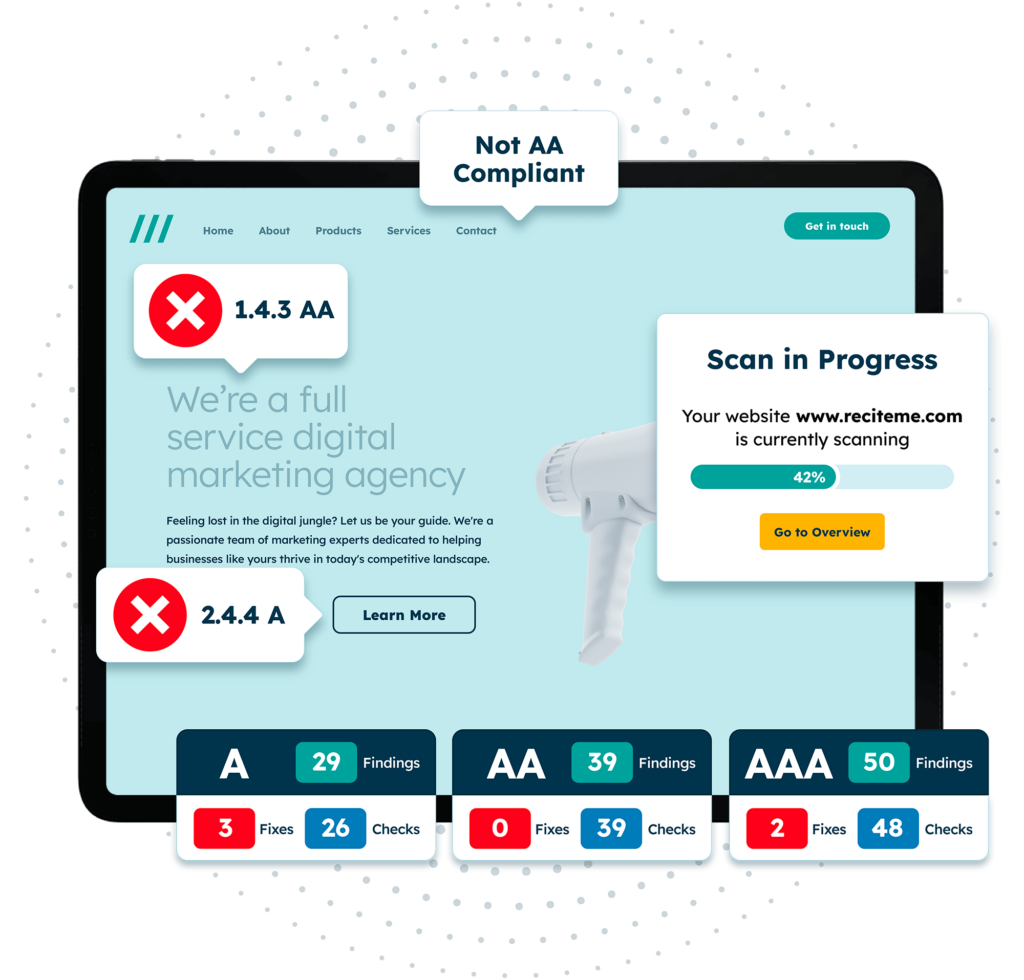
Free Accessibility Check of your Website
Finding accessibility issues is now easier than ever. Recite Me offers a free automated scan of your website’s homepage to highlight non-compliance. You’ll get recommendations on how to fix them, helping to improve your accessibility score.
The Importance of WCAG Compliance
Developing a thorough understanding of the Web Content Accessibility Guidelines (WCAG) is essential because they form the basis of both federal and state-specific web accessibility legislation in Virginia.
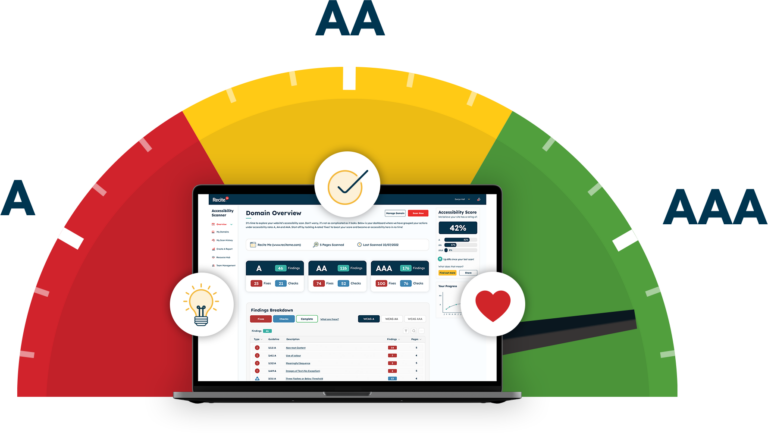
Developed by the World Wide Web Consortium (W3C), WCAG criteria are organized into different levels of conformance, each indicating the degree of accessibility achieved:
- Level A – Basic criteria to provide a primitive level of website accessibility.
- Level AA – Essential criteria to meet an industry-accepted accessibility standard.
- Level AAA – Enhanced criteria to provide an optimum level of accessibility.
The most up-to-date version is WCAG 2.2. Therefore, compliance with WCAGH 2.2 Level AA is recommended to minimize risk.
How to Build and Maintain a Compliant Website
While avoiding legal risk may be the primary driver behind investing in a compliant website, it’s equally important to ensure digital materials are inclusive and usable by all. In other words, it’s perfectly possible to make a technically compliant website that’s still incredibly difficult to use.
To help organizations meet both goals, Recite Me has developed a suite of on-demand accessibility software offering enhanced compliance, usability, and commitment to digital inclusion.
1. Compliance
The first step is to assess your website’s current state. The Recite Me Accessibility Checker simplifies and streamlines this process by conducting 396 separate scans based on WCAG criteria and generating a prioritized fix queue. Whether it’s ensuring proper alt text for images or implementing keyboard navigation, the Accessibility Checker provides actionable insights to guide your compliance efforts.
Schedule a free demonstration or run a free scan today!
2. Usability
By prioritizing inclusivity, you not only comply with accessibility standards but also foster a more welcoming online space. The Recite Me Toolbar empowers individuals with diverse needs and preferences to customize their browsing experience. From adjusting font size and color contrast to accessing content in multiple languages, the Toolbar enhances usability for a broad range of users with varying access requirements.
Schedule a free demonstration, or try the toolbar today!
3. Commitment
Communicating your dedication to ongoing digital accessibility improvements is essential in earning the trust and confidence of disabled website visitors. Recite Me’s Free Accessibility Statement Generator instantly generates personalized accessibility statements for your website that outline your current compliance status and articulate future inclusion goals.

